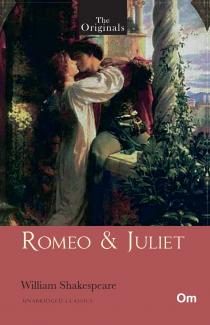The Originals Romeo and Juliet
Prolific English dramatist and national poet William Shakespeare (1564–1616) was born in Stratford-upon-Avon, Warwickshire, England. He lived in London for 25 years and wrote most of his plays there. The author of 37 plays and 154 sonnets, Shakespeare is considered the greatest writer in the English language and a dramatist without equal. Adept at both tragedy and comedy, the bard of Avon encompassed an incredible range of human emotions as well as mystery, magic, and romance in his plays. He wrote tragedies, comedies, and historical plays, and also performed on stage with the actors of the Lord Chamberlain’s Company. The wordsmith left an indelible mark on the English language and invented several words which are in use today. Shakespeare’s widely-adapted tragedies include Macbeth, Hamlet, King Lear, and Othello and his comedies include All’s Well That Ends Well, As You Like It, The Comedy of Errors, The Merchant of Venice, and A Midsummer Night’s Dream. ... Read more Read less
Thus with a kiss I die. Romeo and Juliet, written by English dramatist William Shakespeare during 1594–1596 is one of the bard’s most popular and frequently performed plays. It was first published in an unauthorised quarto in 1597. An authorised longer quarto was published in 1599. A third quarto, based on the second, was used by the editors of the First Folio of 1623. Shakespeare’s main source for the play’s plot was English poet Arthur Brooke’s narrative poem The Tragicall Historye of Romeus and Juliet (1562). In the play, Romeo and Juliet, the young hero and heroine fall in love knowing fully well that their families, the Montagues and the Capulets, respectively, are bitter enemies. The star-crossed lovers are secretly married by Friar Lawrence.When Romeo killsTybalt to avenge the death of a dear friend, he is banished to Mantua. Juliet’s father, unaware that his daughter has wedded Romeo, fix up her marriage. A desperate Juliet seeks Friar Lawrence’s help, but his plan to reunite Romeo and Juliet falls apart and ends in unspeakable tragedy. ... Read more Read less











